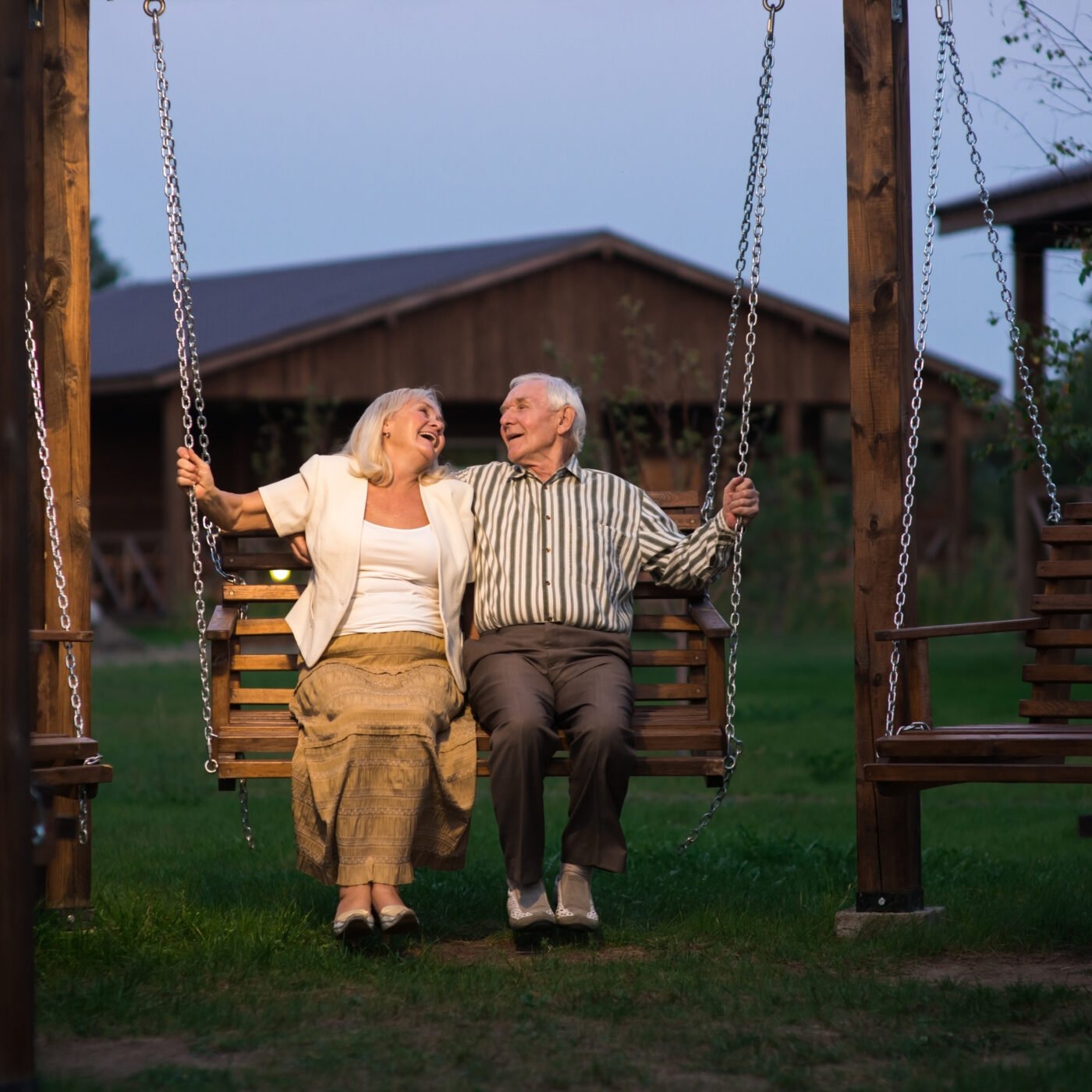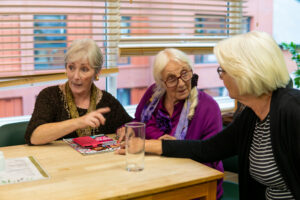Planning holidays in later life
Tags
Getting Out and About in Later Life
Travelling and going on holiday is still important in later life, as it holds many benefits for mind and body. Engaging in new experiences, seeing new places, being active and spending quality time with loved ones can improve our overall well-being and can all be achieved on holidays or days out. For older people, travel encourages more time outside and puts cognitive skills to work, keeping the mind sharp by navigating a new place or learning new languages. It can create opportunities to meet new people, make new friends, or strengthen family relationships outside everyday life.
Some of the holidays and day trips mentioned below require thorough planning and additional precautions, especially when travelling with someone with access needs or dementia. However, we’ve provided tips and guidance on the best way to make your trip as enjoyable as possible in the guide below.
Where can I take an older loved one on a day trip in the UK?
The UK is a great place for day trips, with various options for the whole family, including many accessible attractions – here are a few common but great ideas for a day out in the UK:
The Beach
Nearly everyone loves a trip to the beach. There’s something for almost everyone at the beach – a relaxing view and endless fresh air, rock and tide pools to explore, and of course, plenty of ice cream and fish and chips to enjoy. When visiting a beach with an older loved one, there are plenty of spots to choose from, with easy access to toilets, cafes and shops. Renting a beach hut is also possible at many beaches for added comfort and your own amenities. With Beach Huts, you can have your own private changing facilities and a place to store belongings – while some modern huts now have cooking facilities for food prep and hot drinks.
Museums
Day trips in the UK can be budget-friendly if you choose to visit museums, as many offer free entry or discounts for caregivers. Museums provide cognitive stimulation for individuals of all ages and often host special exhibitions that may be of particular interest to your older loved ones, especially if they have personal ties to the historical era being showcased.
Parks
The UK is known for its stunning parks and gardens, which are well worth exploring. The National Trust is responsible for managing and preserving over 200 gardens and parks in Britain, including historic properties and stately homes. They keep them in a high standard condition and ensure their fascinating stories and objects are available to the public. The National Trust website has extensive information for you to find the perfect park and property for you to visit, including an access guide, the cost, and how you can get a discounted senior membership.
Visit the theatre
This idea may be a bit on the pricey side for a day trip, as it usually involves travelling to a major city, however, it can help your loved one feel more connected to current culture, and you may be able to find a show that makes them feel nostalgic of when they were younger. Companies such as National Holidays organise coach trips to the West End; the price includes travel, theatre tickets and accommodation if needed. The National Theatre has an over 60’s discount for midweek matinees, and if you have a Senior railcard, you can get 50% off theatre tickets at any time of the week.
Companies that can help you plan UK day trips
AccessAble provides information on whether a location will be accessible for you or your loved one. They’ve surveyed 10,000s of venues across the UK and Ireland, from shops, pubs, and restaurants to cinemas, theatres, railway stations, hotels, hospitals and more. They have an app which finds accessible venues and facilities nearby.
Euan’s Guide is a disabled access charity, best known as the disabled access review website – which provides reviews of locations written by people with access needs. They also make accessible toilets safer nationwide, by attaching cards to emergency red cords in accessible toilets which say, ‘This red emergency cord must hang freely to the floor, if it does not, it may prevent a disabled person from asking for help’. They also run the UK’s most extensive Access Survey.
Disability grants list charities and trusts that provide funding towards holidays and days out. Many people aren’t aware of the benefits and grants they’re allowed to claim.

What type of holiday can I take my older loved ones on in the UK?
City breaks
While some people prefer holidays in natural or green areas, you or your loved one may prefer the vibrancy of a city setting. City breaks can be an advantageous choice for older adults and people with accessibility needs, as urban areas often provide convenient amenities, including wheelchair-accessible buildings, many public restrooms, multiple resting spots, and a range of dining, shops and other attractions. Age UK have made an extensive guide on the most and least accessible cities in the UK – with some of the best being Bath, Chichester and Wells.
Caravan and lodging holidays
Staying in a static caravan or park lodge can provide a comfortable and convenient option for a home-like experience in a scenic location. This type of accommodation often offers accessible options and excellent communal facilities that may not be available in other self-catering settings. It can also be a practical choice for multi-generational groups, as larger sites often have entertainment, play areas for children, and amenities for adults, such as on-site shops and facilities.
Door-to-door coach holidays
Door-to-door holidays can be a practical choice for people with a lack of private transportation and may be less costly than paying for multiple transport options. These holidays typically involve travel from their home, often by coach, to various destinations. Additionally, the package includes transportation back to their doorstep at the end of the trip.
These holidays are frequently enjoyed with groups of individuals who are the same age and life stage, providing a great opportunity for those who wish to socialise and make new friends while being away from home.
Planning holidays in the UK
Various companies specialise in finding appropriate accessible accommodation and locations for disabled travellers and older adults, ranging from activity holidays, family holidays, and simple relaxing breaks with accessible lodging options. Whatever your access needs, it’s possible to find a travel agent who can help you with your holiday plans.
Disabled Holidays is a disability specialist travel agency which provides accessible holiday experiences, including accessible cruises and coach holidays. They have a directory where you can search for holidays with wheelchair accessibility, holiday accommodation for people with limited mobility or pet-friendly properties for people with guide and support animals. They also can arrange holidays for people with terminal illnesses.
Tourism for All, or TFA for short, is a small independent national charity whose expert team gives information to disabled tourists about holidays in whichever way they need it. They also work with policymakers to ensure that tourism and travel policies fully account for everyone’s accessible needs so that everyone can receive their right to a proper holiday. TFA operates a membership scheme with a small annual charge.
Revitalise provides respite breaks for adults with physical disabilities, including people with assistance dogs, with care support tailored to their needs, in an assisted living holiday home with hospitality. They run three accessible holiday centres in Essex, Southampton and Southport. Their centres cater for adults with a variety of different disabilities. The centres offer short holidays in a relaxed, holiday-style environment, with various trips and activities. Guests are supported by volunteers who provide companionship and assistance.
Dementia Adventure plans holidays for people with dementia and those who care for them. They plan the holiday for you, or with you, from accommodations to activities and meals. They provide a five-day itinerary for the enjoyment and rest of the person with dementia and their loved one or companion. They have staff available to do the cooking, driving, assist at mealtimes, and accompany you on days out. They will provide as little or as much support as you need.
For more information, The Brain Charity has a detailed holiday guide covering the best holiday companies for older travellers and people with disabilities, funding, and insurance.
Accessible public transport in the UK
In the UK, all public transport must provide an accessible service. However, there may be limitations on the availability of their service and assistance from staff may be required. For trains, it’s advisable to book assistance in advance, especially if you are travelling from a smaller station. If planning to use buses, check local bus routes and their frequency in advance – many services have been cut in the past 10 years, so one you’re familiar with may no longer be running.
Every licensed black cab in London is wheelchair accessible and equipped with ramps.
If you have a Disabled Person’s, Veteran’s, or Senior Railcard and are in London, you can register your railcard discount. This will give you a 1/3 discount on Oyster pay as you-go single fares and daily caps on National Rail, London Underground, and DLR services. Just approach a staff member at any London Tube or Rail station to arrange the discount for you.
For discounted access and senior travel, you do not need a railcard to receive discounts on travel if you’re a wheelchair user and remain in your chair for the journey or are registered blind or partially sighted with an assistant.

What are safe and accessible countries to travel to with older people?
Due to advancements in technology and a growing awareness of disabilities, there has been an increase in inclusivity and accommodations. This has led to the redesign of theme parks, beaches, attractions, and even entire cities to better cater to all people. Therefore, today there are many more options of countries to choose from when planning a holiday with an older person or someone with access requirements. Here are some examples of destinations abroad with great accessibility:
Berlin, Germany
Berlin has declared commitment to being “barrier-free.” This means the city is accessible to people with all types of disabilities. In 2013, Berlin received the Access City award for its efforts in making public transport and new buildings accessible. These efforts also extend to tourist sites, events, and hotels. The city is also known to be flat, without many steep hills to navigate.
Hanauma Bay, Hawaii
A great option for people who want to have a sunny, relaxing time on tropical beaches is Hanauma Bay in Hawaii. The beaches here provide wheelchairs free of charge. All of the facilities are accessible, including the city buses and the tram that goes to the beach. While their cinemas have separate screens with closed-captioning.
Kruger and Swaziland, South Africa
For people who want a safari holiday, Access 2 Africa Safaris in South Africa specialises in disability-friendly accommodations. They won the 2016 South African Lilizela Tourism Award in four categories. They cater to all individuals, including wheelchair-accessible packages and tours for the hearing-impaired and visually impaired. Along with the accommodation, they have one-day, seven-day, and 12-day safari experiences for all.
How to prepare for travelling with an older loved one
When planning a holiday, it’s advisable to prepare the below factors before and during the trip;
Do your research on the location, including the hotel and local area, to ensure accessibility and that there are enough food options to meet dietary requirements and tastes.
Ensure you have an adequate supply of medication or other necessary items. You may need to contact your doctor to discuss the need for additional medication if your current prescription will expire while you’re away.
When arranging travel insurance, it’s important to buy a policy that includes coverage for pre-existing medical conditions. This may require seeking out holiday insurance options specifically designed for older people, as they may provide more comprehensive coverage than standard policies – you can compare senior travel insurance here.
If you or a loved-one have mobility issues, arrange for specific transportation or request a ground-floor room.
Inform your family, friends, or neighbours about the details of your holiday, the address of the place you’re staying and contact numbers in case of emergency.
Make arrangements for any pets or plants to be looked after or house-sitting well in advance of you leaving.
Companies to help plan your holiday abroad
Enable Holidays are a tour operator that selects supported holidays and accessible friendly holidays to meet varying requirements.They have a catalogue of hotels, villas and apartments, with detailed information on each, about whether there is access suitable for you in bedrooms, bathrooms, pools and public areas, plus how accessible the location and surrounding areas are.
Enable Holidays conducts audits of all the hotels they use to ensure they’re suitable for individuals in wheelchairs, slow walkers, and those with limited mobility. Assistance with adapted airport transfers is also provided.
Disabled Holidays also helps plan holidays abroad. It is a disability specialist travel agency which provides accessible holiday experiences, including accessible cruises and coach holidays.
Accessible transport when going abroad
Pre-inform your airline, tour operator, and accommodation provider.
It’s important to communicate your mobility and medical circumstances with the tour operator, airline, and accommodation provider. It’s also recommended to provide all the details in writing. The ABTA checklist can help you determine the necessary information.
Travelling with a wheelchair
When travelling with a wheelchair, it’s advisable to have a certificate of compliance for motor batteries and to request wheelchair availability when travelling by air. If the wheelchair requires minor repairs while away, it may be possible to seek assistance from a local hospital. Additionally, carrying a door wedge can be helpful in keeping doors open when moving around your accommodation or navigating shops or restaurants.
The Blue Badge Scheme is implemented in Europe and other regions.
The UK Blue Badge can still be used for travel in certain EU countries, as well as Liechtenstein, Norway, and Switzerland. Other EU and EEA countries have also agreed to reciprocate recognition of the blue badge scheme, but these agreements are not obligatory. The decision to accept parking cards from foreign countries is up to the authority in charge of the host country. It’s advisable to check whether your blue badge will be accepted before travelling.

What holiday options are there for people living with dementia?
Whatever type of holiday you or your loved one wants, from walks in the countryside and relaxing on a beach, to exploring new cities and shopping, there are a number of specialist companies that can help fulfil your requirements.
You can get support from certain holiday providers with safe environments and dedicated staff with the skills and experience necessary to cope with a wide range of health issues, leaving you free to relax and make the most of your time away from home.
Tips for travelling abroad with dementia
Get to the airport early
Arriving at the airport with plenty of time before your flight, allows you to complete all pre-boarding rituals and get through security without rushing. Having plenty of time can also make it easier to manage any stress or confusion your loved one may experience. However, do not arrive many hours early, as the person may still become disoriented and anxious while waiting in an unknown location. One suggestion is to arrive 1 to 2 hours early for a domestic flight and 3 to 4 hours early for an international flight.
Before you arrive at the airport, you can check the website for maps and familiarise yourself with where help points are located.
Inform staff that you’re travelling with a person with dementia
They can provide assistance with security checkpoints and offer a wheelchair if necessary. You can contact the airline or travel agent to ask if there are any assistance services you can prebook.
A wheelchair can be beneficial even if the person with dementia can walk, as it indicates that they require assistance. However, this approach is only effective if the person with dementia agrees to use a wheelchair.
The Hidden Disabilities Sunflower is a wearable lanyard you can use to indicate that you or your loved one has a disability or condition that may not be immediately noticeable. This can help in the airport to inform staff and other passengers that you may need assistance or extra time.
Passengers with additional needs are given priority boarding if they inform the airline. Many airports have staff available to assist passengers in navigating their way around.
If you’re on a long-haul flight, it’s beneficial for the cabin crew to know that you’re travelling with someone with dementia, so if you need to sleep, they can assist the person with getting to the toilet or with meals.
Avoid loads of hand luggage
You want to be able to directly assist the person with dementia, so you want to have free hands.
Let them go through security in front of you
If the person encounters any issues, such as triggering the security alarm or being selected for additional screening, you may still be able to help them if you have not yet passed through. However, once you are in front of them, returning to help is not allowed. People living with dementia may struggle with complex instructions and automated areas of the airport, so going behind them and explaining to staff that you may need to offer them additional support is key.
Bring distractions
Bring their favourite snacks, photos, books, or puzzles, as this could offer a pleasant distraction and reduce the risk of becoming agitated or anxious. Noise-cancelling headphones could be useful while waiting in the terminals or on the flight to tune out extra noise.
Companies to assist with specialised holiday planning
There are lots of companies that provide elderly care as part of a holiday package, so you’re sure to find a holiday option that suits you both.
Becoming a member of Tourism For All costs around £25 per year and gives you access to a wealth of information about suitable holidays. The organisation will help you to establish the best holiday options for your needs, as well as provide you with access to discounted hotels and insurance deals.
Dementia Adventure offers a brochure of holiday options, from seaside breaks to hill-walking, and you can even take advantage of specialised package holidays in Portugal too. The company provides group travel options or will put together a bespoke package for you, depending on your particular needs and wishes.
The MindforYou holiday company was established by Carol Sargent when she realised that her mother wasn’t happy in respite care while the rest of the family went on holiday. Staff members personally visit the homes of people interested in these holidays, helping them to establish the most suitable destination, as this ensures that they are provided with all of the necessary support that they require.
Revitalise specialises in providing holiday solutions for disabled people and their carers, and offers a choice of holiday destinations for people with dementia. You can choose the level of support from four separate packages, allowing you to tailor the care according to your loved one’s needs.
Read more care guides

How to prepare for a live-in caregiver
Care at home: how to prepare the home for a live-in caregiver A live-in carer can make a massive difference to your loved one’s quality

6 tips for finding the right live-in carer
Finding the right live-in carer is a significant and deeply personal decision, impacting your loved one and the entire family. You’re seeking someone trustworthy, compassionate,

The cost of care – everything you need to know
The true cost of care – everything you need to know Discover the true cost of care and explore your funding options with our care

Understanding autism in older adults
While Autism is usually diagnosed in childhood, an increasing number of older adults are being formally diagnosed in later life. Masking autism symptoms can result

A guide to speaking with a loved one about home care
Why do older adults resist care? A guide to speaking with a loved one about home care Bringing up the topic of care at home

How to choose the right personal alarm for seniors: A comprehensive guide
Personal alarms for elderly Discover how personal alarms work, who they’re best suited to, and how they provide greater peace of mind to older people